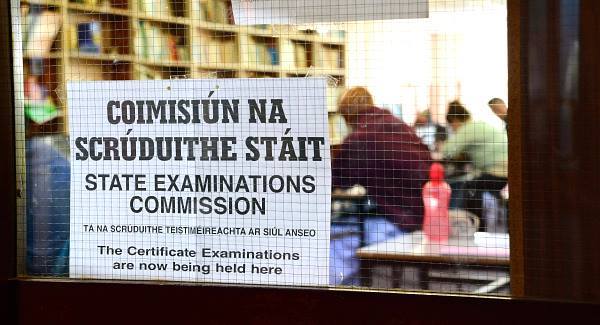
Anyone who has sat their Leaving Certificate has had at least one nightmare giving them a flashback to the stressful exams. However, the Leaving Cert students of 2020 are bound to have some of the worst flashbacks after them being affected so much by the Covid-19 pandemic.
In pre-coronavirus days, if someone were to tell you that your teachers would ultimately decide the outcome of your Leaving Cert you would naturally start to work harder in each class to ensure you get good grades, or else you’d start to panic about that one teacher who you think hates you.
If someone were to also tell you that the last few months of your school days were going to be robbed from you, you couldn’t even begin to imagine how that might feel. No graduation, no awards ceremony, no debs. Nothing to commemorate the end of this phase of your life as you embark on a new one.
For thousands of Leaving Cert students across the country this was the unfortunate case. With school closures and a nationwide lockdown, graduation and other ceremonies could not go ahead. The conventional Leaving Cert, that was set to start in June, was cancelled.
Students were given the option of sitting a traditional written exam at a later date, which is now confirmed to be November, or to receive predicted grades from their teachers.
The predictive grades go through an extensive process; first the subject teacher gives an estimated percentage, each student’s grades are overlooked by their principal. Finally, the Department of Education reviews the grades.
On top of the lengthy process, the Department ensured that students were not judged or graded based on their school’s history, their gender or, their location.
The Minister of Education, Norma Foley, said that past academic performance was not going to be used to ‘standardise’ the student’s results. Instead, more emphasis was placed on the student and the estimated marks provided by teachers.
“The student, and not the system, is the priority,” Minister Foley said in a recent statement.
Under this model, 17% of the teacher-predicted grades were to be reduced, while 4% were to be increased, according to The Journal.
The only thing here that could possibly go wrong is if thousands of students received the wrong grades…which unfortunately did happen.
Around 6,500 students received the wrong grades following a coding error. This amounts to 10% of those who opted for predictive grades. Students were left confused and worried as they had to wait several days after the announcement to find out if they were among those affected.
Speaking at the Department of Education, Minister Foley apologised to the Leaving Cert students and said that no student would be downgraded as a result of the error.
The error happened when the Junior Certificate results were mistakenly used in the moderation process carried out by the Department of Education. The system included Junior Cycle marks from the subject CSPE and picked up on students’ two weakest subjects rather than their strongest after English, Irish and Maths.
Minister Foley said that the majority of students who receive an improved grade will receive an upgrade in only one subject, with a small number of students receiving an upgrade in more than one subject.
“Where at all possible” students who are entitled to a higher offer on their CAO list will be offered a place on that course this academic year, she said.
The department will work with Higher Education Institutions and the CAO to determine how those students can be facilitated to start their preferred course. The Department of Further and Higher Education has confirmed with RTE that students who have already started a course, but receive an offer on their preferred course, will not have to pay additional fees.
Minister Foley confirmed that the department has carried out a serious of checks and has not identified and further errors in the coding system.
Aidan Cusack, a Leaving Cert student in Co Mayo, was one of the misfortunate students to be affected by the coding error. Cusack decided to opt in for predictive grades as he needed to save money for college and said: “it wasn’t feasible for me to keep up studying and working at the same time.”
When looking at his averages from previous performance in his subjects, Cusack believed he was going to get good grades. However, some turned out to be lower than he hoped for.
Due to his lower grades, Cusack missed out on an Irish and Sociology course in TCD and was instead offered a place in the History and Irish course in UCD. He decided to defer his place knowing that it would primarily take place online.
Based on his upgraded results, Cusack hopes he will be offered a place in his first CAO choice in TCD. He feels as though he is still in a better position than a lot of students since he decided to take the year out.
The predictive grade model left Cusack (19) feeling badly about himself when he didn’t receive the grades he hoped for and expected.
“I feel that I was made feel disappointed at myself when the CAO offers came out, but as I know now what happened was at the fault of the department and not mine.”
It is not yet known exactly how many students missed out on college places and were affected by the systemic grading error as it has to undergo an independent review. What is known is that every Leaving Cert student in Ireland never got to live out and experience their last few months as a school student. Instead, they were landed with a stressful send off to their new phase in life.
Note: This article was reuploaded on 04/04/2021 due to a fault with The College View website.
Emily Clarke
Image credit: The Irish Examiner



